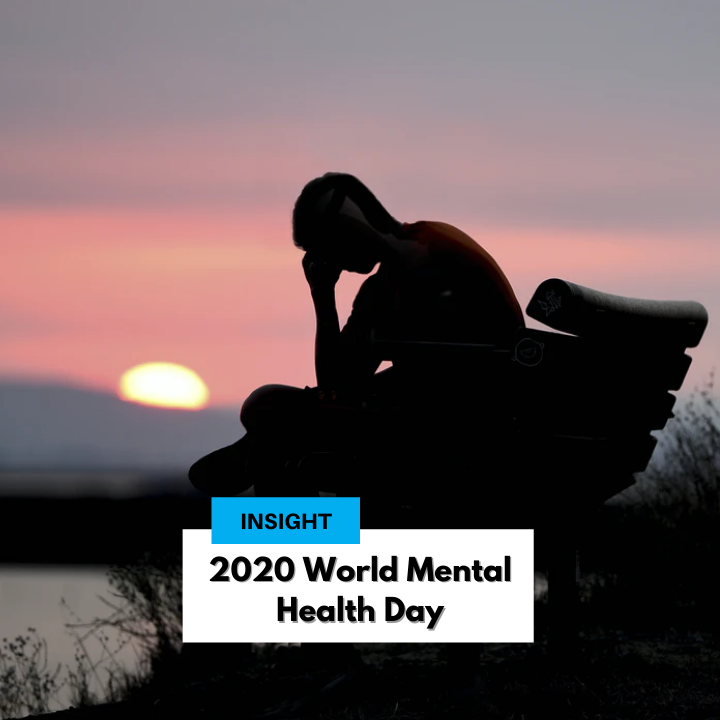
2020 World Mental Health Day – How much progress have we made and are we really ok?
As we start to approach the end of a year that has seen people’s lives turned upside down, 2020 is likely to be the most poignant event in World Mental Health Day’s 28 year history. Its theme, Mental Health for All, is certainly one that will resonate across the globe.
The day was first launched in 1992 by the World Federation for Mental Health. Commemorated annually on October 10th, World Mental Health Day is recognised for promoting mental health advocacy and educating people about its importance.
Mental wellbeing is a topic that is close to my heart and 2020 has also marked the ten year anniversary of losing a close family friend to suicide. I’ve recently found myself reflecting on how much progress has been made in the last decade when it comes to mental health awareness and support, and whether the outcome may even have been different for my friend were he still here today.
There is no doubt that a huge amount has changed. One of the most notable being a significant shift in our attitude and acceptance that mental health is something we all have and just like our physical health we need to take care of it in order to remain well.
Most education providers and companies now have wellbeing policies in place and discussions surrounding mental health are more actively encouraged in these environments. There is more care in the community, more talking therapies available and a huge wealth of resources for us all to access if we need to.
Yet, in spite of the positive changes, barely a day goes by where we don’t encounter stories about the devastating effects of poor mental health in our society, with death from suicide remaining the biggest killer of men under 45. Unlike ten years ago, most of us will readily admit that we have been touched by poor mental health in some way, whether from personal experience or through concern for those around us.
I will never know whether my friend would have overcome his illness if he’d had access to the increased support and awareness we see today. But I do know that although we have come a very long way in a relatively short space of time, we are still only at the tip of a very large iceberg.
The sad reality is that our mental health is not yet normalised in society in the same way physical illness has been. The statistics from recent studies speak for themselves:
- 9 out of 10 people who’ve experienced poor mental health say they have faced stigma as a result of their illness.
- 56% of employers would be hesitant to hire someone with depression, even if they were the best candidate for the job.
- Only 11% of employees have discussed a recent mental health problem with their manager.
- 69% of UK line managers say that supporting employee wellbeing is a core skill, but only 13% have received mental health training.
- 1 in 5 people take a day off due to stress. Yet, 90% of these people cited a different reason for their absence.
- The average person says, ‘I’m fine’, 14 times a day in response to the question, ‘how are you’?
It’s clear to see that the reality of the situation doesn’t quite tally with the volume of marketing messages we see from companies about the importance placed on the mental and physical wellbeing of their employees.
Policies and processes are great, but they need to be so much more than a box ticking or marketing activity and can only be effective in the long term if they are driven through authenticity, action and a real commitment to create change.
The same applies to us as individuals. I’m sure most of us are guilty of telling people we’re fine when the opposite is true. We’ve become masters at hiding any symptoms that could give away how we’re really coping with day to day life, and that alone can make it difficult for people around us to recognise the signs and offer help.
Just like a physical illness, nobody should have to face a mental health problem alone. We live in a society that actively encourages us to take notice of our own mental wellbeing, so why do we still find it hard to be honest about how we’re really feeling?
I am not an expert in mental health. But I am human and like every other person in the world my mental health and wellbeing isn’t always 100%. I am also an employer, a daughter, a friend, a wife, a sister and an aunty. We all lead multi-faceted lives, but our innate ability to show compassion and empathy for others is fundamental to the relationships and roles we play.
Sadly, we tend to lack the same compassion and empathy with the relationship we have with ourselves. I wouldn’t hesitate to encourage those around me to speak about their mental health but would feel anxious discussing my own and I know I’m not alone with this.
Like every other organisation, we have made great leaps forward at recognising mental health and educating ourselves about the importance it has on each and every one of us. We have policies in place, we have mental health first aiders, we encourage people to talk and be transparent about their mental health. Not only are we ticking all the boxes, we are a team who genuinely cares deeply about each other.
I am immensely proud of the work we have put in to reach this point, but I recognise that we are just at the beginning. We have become better at spotting the signs, better at knowing how to access support and better at understanding how to manage our individual stress levels. Yet our response to the question, ‘How are you?’ largely remains the same.
With approximately 50% of the UK’s workforce working remotely, recognising the signs that our colleagues might be struggling will inevitably become more difficult and this is something we need to address.
This year, World Mental Health Day, is asking everyone to do one thing for better mental health. At ADPR, we have had many conversations about how we protect our wellbeing during these difficult times and how we can support our colleagues when we aren’t physically connected. Like most things in life, better communication is going to be key.
For us, that is going to be a conscious commitment to be kind to ourselves, to talk more honestly, listen more openly and to feel safe in our working environment – wherever that may be.
We may still have a long way to go, but we are giving ourselves full permission to get there.
Building on your PR strategy doesn’t need to be complicated or costly, but you need to create and deliver a comprehensive plan because it will have a positive impact on the bottom line of your business. Don’t just download our PR For Small Business guide – actively utilise the tools it offers for your business. We guarantee you’ll see results!




